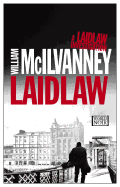
Originally published in 1977, William McIlvanney's Laidlaw, the first book in a trilogy, set a standard for noir mystery. In this reissue, McIlvanney's gruff, broad strokes read as freshly as ever.
Glaswegian detective inspector Laidlaw is the quintessential hardened, hard-drinking cop. When thug Bud Lawson's daughter doesn't come home, Bud wants Laidlaw's help. Where other cops hold Bud's criminal past against him, Laidlaw is willing to assist. For this case, unconventional Laidlaw is partnered with ambitious, impressionable detective constable Harkness. He's an excellent foil for Laidlaw, and the growth and development of their relationship throughout is a satisfying side plot.
A murdered teenage girl wouldn't usually seem related to the network of thugs and gangsters that run Glasgow's criminal industry. But her killer--exposed to the reader early on--quickly becomes a pawn. Bud's gangster associates want him so they can exercise their revenge; other gangsters with other connections want him spirited safely out of town; and, of course, Laidlaw has his own goals.
The phonetically spelled Scottish brogue adds color to dialogue, and McIlvanney's lyricism is surprisingly refined in this coarse world ("She waited patiently for his head to come back from a walk around his guilt"). Laidlaw is not so much action-packed--although there is plenty of head-busting--as it is considered, psychological and concerned with the existential. McIlvanney has earned his reputation as the father of "tartan noir," and readers will be glad to know that rest of this trilogy is set for re-release in late 2014. --Julia Jenkins, librarian and blogger at pagesofjulia

